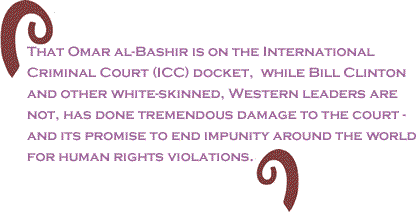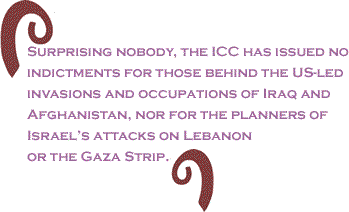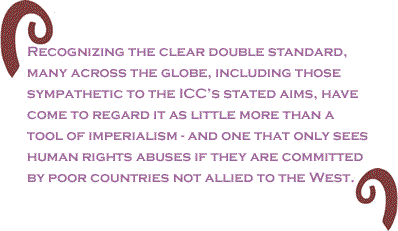
|
|||||||||||||||||||||||

|
|

Custom Search
|
|
 |
|
After an hour-and-a-half of walking under the intense Sudanese sun, armed with crude maps printed from the internet, we paused before a field of rubble in an industrial area of North Khartoum. Two teenagers sat on the porch in front of the still-partially standing building, conversing and watching the world go by in this gritty, dusty area of the Sudanese capital. “Al-Shifa?”, we mustered as a question, the name of the massive pharmaceutical plant that stood on this site until just over a decade ago. They nodded. “Bill Clinton”, we responded, pointing to the ruins of the facility that his administration bombed in 1998. The two boys chuckled. Just over a decade after the US bombing of al-Shifa, on March 4 of this year, a different leader - Sudanese head-of-state Omar al-Bashir - was indicted by the International Criminal Court (ICC) for war crimes and crimes against humanity. That Bashir is a war criminal whose policies are responsible for widespread death and destruction in the Western Sudanese region of Darfur is well-documented. Yet, after stepping over rolls of decaying labels for life-saving malaria medication at al-Shifa - and watching mounds of dark brown medicine bottles, some still full, baking in the afternoon heat - it seemed an appropriate point to pose what should be an obvious question: why is the ICC not seeking to indict Clinton as well? Though the death toll from the bombing is unknown, Werner Daum, German ambassador to Sudan during the bombing, noted in a 2001 Harvard International Review article that “several tens of thousands seems a reasonable guess” for the number of deaths resulting from the subsequent lack of medicines in the country. Double standards That Bashir is on the ICC docket, while Clinton and other white-skinned, Western leaders are not, has done tremendous damage to the court - and its promise to end impunity around the world for human rights violations.
Recognizing the clear double standard, many across the globe, including those sympathetic to the ICC’s stated aims, have come to regard it as little more than a tool of imperialism - and one that only sees human rights abuses if they are committed by poor countries not allied to the West. The ICC has done little to disprove this thesis. Of the four ICC investigations, all have been in Africa. Moreover, they have all targeted either groups hostile to the West or Western allies (the Sudanese government, as well as Joseph Kony’s brutal Lord’s Resistance Army rebels, who are fighting the authoritarian, US-aligned Yoweri Museveni government of Uganda), or those whose crimes are safe to be prosecuted because they stem from conflicts that have evinced relatively little Western interest (guerrillas in the Democratic Republic of the Congo and the Central African Republic). Surprising nobody, the ICC has issued no indictments for those behind the US-led invasions and occupations of Iraq and Afghanistan, nor for the planners of Israel’s attacks on Lebanon or the Gaza Strip.
Other potential ICC indictment uses These serious departures from impartiality aside, the case against Bashir, like the others pursued by the court, is in response to an undoubtedly grim set of crimes. As such, these cases must be judged on their unique criteria, rather than dismissed out-of-hand. The people of Darfur, as well as leftists and opposition figures from throughout Sudan who have been struggling against the ruling regime, deserve nothing less. As the ICC has no enforcement mechanism beyond the responsibility of member states to arrest wanted individuals, it is highly improbable that Bashir will face trial anytime soon. Taking a page out of the playbook of war criminals like former US secretary of state Henry Kissinger, Bashir can simply evade arrest by not traveling to countries likely to execute the warrant. Still, many Western commentators have lent support to the ICC indictment, generally for some combination of the following reasons: 1. Though the absence of polling data makes it impossible to verify, the majority of Darfurians from the victimized groups seemed to initially support the ICC, and see it at least as a symbolic victory in their struggle with the central government. However, Khartoum’s expulsion of many aid groups, as well as the fact that it is very unlikely the warrant will be executed in the foreseeable future, suggest that popular enthusiasm may dampen over time. The Joseph Kony case in Uganda has proceeded in exactly this fashion. 2. If the indictment were to serve as a deterrent to future abuses, either by Bashir or a future crop of would-be human rights violators in Sudan or elsewhere, then it could potentially be justified under the rubric that it will prevent the next Darfur from occurring at all. However, as noted, there is very little chance that Bashir will be arrested in the short term. 3. Some have opined that the warrant would weaken Bashir, perhaps sparking a popular revolt and ushering him out of power. Unfortunately, as Sudanese opposition movements have been gutted by more than 20 years of dictatorship; no such uprising seems imminent. In a variation of this theme, there has been much speculation that another - potentially more pragmatic - member of Bashir’s regime could depose him, and take the reins of power. Yet a change at the top of the totem pole would not necessarily mean a substantive change in policy. Grasping at straws, the high-profile advocacy group, the Enough Project, tentatively endorsed, in a February 12 statement, reprehensible figures such as Sudanese intelligence chief Salah Gosh for this task, noting that while he “bear[s] significant responsibility for crimes against humanity committed during the regime’s 20-year rule” (including in Darfur), he has “shown willingness to work with the international community”. The advocacy group accurately call Gosh Washington’s “favored interlocutor on counterterrorism”. In other words, Gosh’s palatability as Sudan’s would-be ruler can be gauged by his coziness with the CIA, while his lead role in the atrocities in Darfur is of no concern.
Offering further evidence of his civility, Gosh recently sent a warning to domestic opposition movements, stating that anyone who attempts to execute the warrant will have his limbs and head “chopped off”, according to a February 24 International Herald Tribune article. Darfurians can be forgiven if they feel less than grateful for the Enough Project’s peculiar brand of advocacy. 4. There is a legitimate hope that the “international community” could use the warrant as critical leverage over Khartoum, promising deferrals - perhaps indefinitely - in response to it taking concrete steps to address the Darfur conflict. Uncertain path However, the West seems unlikely to seriously pursue any opportunities for using the ICC to pressure Khartoum into constructive peace talks. Institutions of justice live and die based on their legitimacy. If the ICC had the initiative to pursue the powerful and their friends, the prospects for justice in Darfur would brighten considerably. The ICC has broken new ground in issuing its first-ever arrest warrant for a sitting head-of-state, but has no obvious way forward. How the world proceeds will determine not only the future of the Sudanese nation, but will also impact long-simmering efforts to end impunity everywhere. BlackCommentator.com Guest Commentators, Steven Fake and Kevin Funk, are the co-authors of The Scramble for Africa: Darfur-Intervention and the USA. They maintain a website with their commentary at http://www.scrambleforafrica.org. Click here to contact Mr. Fake and Mr. Funk. |
|
Any BlackCommentator.com article may be re-printed so long as it is re-printed in its entirety and full credit given to the author and www.BlackCommentator.com. If the re-print is on the Internet we additionally request a link back to the original piece on our Website. Your comments are always welcome. eMail re-print notice
If you send us an eMail message we may publish all or part of it, unless you tell us it is not for publication. You may also request that we withhold your name. Thank you very much for your readership. |
|
| |
|
| April
2 , 2009 Issue 318 |
|
| Executive Editor: Bill Fletcher, Jr. |
| Managing Editor: Nancy Littlefield |
| Publisher: Peter Gamble |
| Est. April 5, 2002 |
Printer Friendly Version
in resizeable plain
text format or pdf
format. |
| Frequently Asked Questions |
 |

|
 |
 |
 |
| |
| |





































